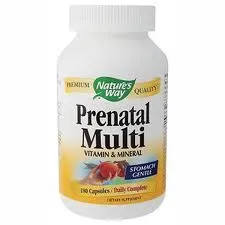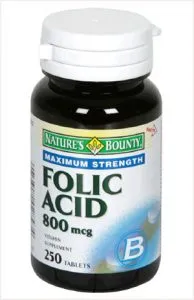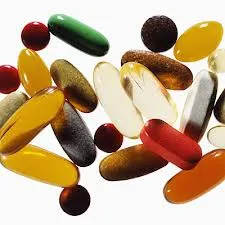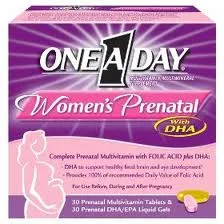Keeping up with a regular exercise ritual and a balanced diet are great places to start, but all women of childbearing age will benefit from one more very important step—taking prenatal vitamins.
Unless you have a perfect, organic, vitamin filled diet, you are not getting the vitamins and minerals you need to support you, let alone your baby, so you need a secondary source of nutrition. We’ve taken the time to outline what prenatal vitamins are, why you should take them, and where you can get them.
[table id=7 /]
Why Should I Take Prenatal Vitamins When I Already Eat a Healthy Diet?
Many of us forget to take the daily vitamins that our own parents recommended when we were children. Our health doesn’t appear to suffer when we skip our vitamin. A typical modern diet takes care of our nutritional needs.
However, the daily prenatal vitamin is much more important.  Doctors have known for years that the best prenatal vitamins help to prepare a woman’s body for the challenges of pregnancy.
Doctors have known for years that the best prenatal vitamins help to prepare a woman’s body for the challenges of pregnancy.
Think about it: your body is going to be homebase for a growing child. That child needs to grow a healthy heart, brain, bones among other vital body organs.
In order to do this, that baby is going to pull from a large supply of consistent nutrients for 9 months. The best prenatal vitamins provide a simple way to maintain healthy levels of nutrients for yourself and your baby.
Taking Vitamins Before You Are Pregnant
It might seem strange to hear that experts say you should take prenatal vitamins before you become pregnant.
Why should you go to all that trouble if you aren’t pregnant yet, or you don’t even plan to be pregnant for a while?
According to the Women’s Health Office of the US Department of Health and Human Services, a number of nutrition related birth defects affecting the brain and spine can develop during the first trimester. This is often before a woman realizes that she is pregnant.
Taking a natural prenatal vitamin before pregnancy is the best way to prepare and protect your health, and the health of your future baby.
When pregnancy occurs, your body will be in the best shape to support this magical experience. Think of it as kind of “stocking up” on nutrients in preparation for your baby.
As soon as you are pregnant, that baby will immediately start pulling nutrients from your supply. If that supply hasn’t already been stocked, it will start drawing from your personal nutrients, which creates a lack for both of you. Needless to say, start stocking up!
Benefits of Taking Folic Acid Before Pregnancy
The March of Dimes suggests that a multivitamin with folic acid is one of the most important steps you can take to encourage a healthy pregnancy.
Folic acid helps to prevent anemia in the mother and it also prevents brain and spine related birth defects in the baby.
Folic acid is found naturally in beans, citrus fruits and green vegetables, but it is difficult to get enough folic acid from the foods you eat and your body is not able to store it. Fortunately, the right amount of Folic Acid is easy to add into your diet with a prenatal vitamin.
It is recommended to take 400 micrograms of Folic Acid before and during the first few weeks of pregnancy.
Regular Folic Acid intake will help reduce the risk of birth defects in babies such as spina bifida and anencephaly.
The Centers for Disease Control and Prevention (CDC) reports that women who take the recommended daily dose of folic acid starting at least one month before they conceive and during the first trimester of pregnancy reduce their baby’s rise of neural tube defects by 50 to 70 percent.
What Prenatal Vitamin Should I Purchase?
The best prenatal vitamins are the ones that give you every nutrient you need. All prenatal vitamins provide healthy levels of more than a dozen important nutrients.
If you do not like to swallow tablets, chewable prenatal vitamins are available. You may also want to stay away from artificial colors and sweeteners.
You will want to compare the many brands of prenatal vitamins before you can decide which brands are the best for you.
If you have allergies to certain ingredients that are used in the common vitamin brands, you will need to choose your brand carefully. Natural prenatal vitamins are a great choice in this case.
Some everyday brands, like One a Day prenatal vitamins have the same nutritional levels as the prenatal vitamins prescribed by a doctor.
One a day is a great choice to start out if you don’t have much experience and are looking for a good solid starter. You should be able to purchase them at your basic general store.
When shopping for prenatal vitamins, check with your doctor and make sure that your vitamins have the following:
- **Iron-**this supplement is key to your body in producing enough blood for your baby, and yourself. If you lack iron you can find yourself very fatigued as well.
- Calcium- a pregnant mother needs calcium to maintain healthy bones and provide the child with the nutrients to grow theirs.
 Thiamin- Thiamin allows you to convert carbohydrates into energy. It’s vital to your baby’s development in the brain and helps with the functioning of your heart, muscles, and nervous systems. Take about 1.4 milligrams daily.
Thiamin- Thiamin allows you to convert carbohydrates into energy. It’s vital to your baby’s development in the brain and helps with the functioning of your heart, muscles, and nervous systems. Take about 1.4 milligrams daily.- Riboflavin- Your body doesn’t store Riboflavin, so you have to supplement for it. It is good for muscle, nerve, and baby bone development and is also great for vision, skin, and growth.
- Niacin- with a recommended intake of 18mg per day, Niacin is critical in pregnancy because your body uses it to turn food into energy, as well as to help DNA structure, cell signally, and cell differentiation.
- Vitamins B12- According to the National Institutes of Health, Trinity College Dublin, and the Health Research Board of Ireland, women with low levels of Vitamin B12 just before or after conception are more likely to give birth to children with neural tub defects.
- Vitamin D- It is critical to have this to promote healthy bones and teeth. Also, a deficiency can cause growth retardation and skeletal deformities. It is also said to have an impact on birth weight.
- Zinc- You need zinc for the production, repair, and functioning of DNA. This makes it especially important to have in pregnancy.
- Vitamin C- helps your body fight infection. Helps with healthy skin, bone growth, wound healing, and tissue repair.
- Folic Acid- Prenatalgyn.com says Propery folic acid consumption during pregnancy can help reduce the chance of neural tube defects by 70% and the occurrence of pre-eclampsia by over 60%
Do Prenatal Vitamins Offer More Than Good Nutrition?
 One rumored perk about prenatal vitamins is that they can give you bright healthy skin, strong nails and shiny hair.
One rumored perk about prenatal vitamins is that they can give you bright healthy skin, strong nails and shiny hair.
Some people say that this is just an old wives’ tale. Their claims have not been proven by any study, but many women insist that the boost of nutrition from their daily prenatal vitamin also brought a boost of beauty!
Shiny hair and stronger nails aside, the most important benefits of prenatal vitamins are the health benefits they provide for your baby. Those benefits have been widely proven. Taking your prenatal vitamins everyday will give your baby the gift of a nutritious start in the world.
A Comparison of the Best Prenatal Vitamins on the Market
We understand that it can be intimidating when you first start looking for prenatal vitamins. That’s why we’ve taken it upon ourselves to line out the best ones available on the market today.
New Chapter Organics Perfect Prenatal Vitamin
The great part about this, and why we’ve put it at number one, is for two reasons
- It is all natural, and
- It contains 23 vitamins and minerals.
It’s always great to hear all natural, because you never want to put anything artificial inside of you, especially when you have a baby.
The 23 vitamins and minerals in this prenatal are designed specifically for proper nutrition for your baby, and then the right supplements to ensure that you have proper levels of energy, which impressed us enough to put it at number one.
1. One A Day Women’s Prenatal
One a day is a very notorious brand, and lands in our second spot because of the quality. It  has all the vitamins and minerals that you need while maintaining a high quality.
has all the vitamins and minerals that you need while maintaining a high quality.
We don’t see anything that they leave out in their supplement facts, and from pure experience, we’ve never had a bad one.
2. Prenatalgyn
Prenatalgyn is a great product because it is 100% natural with no artificial coloring. Also, these 35 vitamins and minerals are very easy to digest which in turn maximizes nutrient absorption. Also, Prenatalgyn offers a 90 day money back guarantee which is always nice.
3. Rainbow Light Prenatal Vitamins
This vitamin contains everything you’d expect in a multi-vitamin, plus specific vitamins needed for carrying a child.
There is no artificial ingredients, everything is all natural, and there are 90 tables per bottle. These vitamins are lactose intolerant and gluten friendly, as well as being free of animal products and by products, so Vegans can use it also..
4. Vitafusion Prenatal Gummy Vitamin
These prenatal vitamins are great to take because not only are they great quality, but they taste delicious while still maintain natural flavors and colors. They have plenty Omega 3 DHA, Vitamins A, C, and D, as well as Folic Acid. They have everything you need to ensure proper nutrition during your pregnancy.
The Benefits of Folic Acid in Prenatal Vitamins
Many different opinions about proper healthcare and nutrition have been espoused by health care professionals over the years. Though some controversy has arisen between different medical professionals opinions, nearly every MD is on the same page when it comes to the importance of folic acid to prenatal health and proper baby development.
What is Folic Acid?
Folic acid is a B-Vitamin that occurs naturally in vegetables and other foods in the form of folate. Because of the relatively low amount of folic acid in the average dietary practices of nearly everyone in America, health care, Professionals recommend taking 400-800 micrograms of Folic Acid up to a month before pregnancy and for at least 3 months after conception.
Sources of Folic Acid in Prenatal Vitamins
Folic acid occurs naturally in many foods such as Yeast extract spread or Marmite, Animal Liver and dried Herbs. However since these are not generally part of most diets you might turn to sunflower seeds, dry roasted soybeans or green leafy lettuce. Consuming the recommended amount of folic acid is difficult through these more convenient methods.
Fortunately most prenatal vitamins have 400-800 micrograms of folic acid and are in easy one a day tablet form. Healthcare Professionals recommend that all women of childbearing years, who intend to have children should take folic acid even before they get pregnant, I cannot stress enough how important it is to take folic acid before and during pregnancy.
On our homepage we’ve outlined the best prenatal vitamins that contain Folic Acid. All but one contain it, and we highly recommend choosing any of the ones that do.
Neural Tract Defects From A Folic Acid Deficiency
Neural Tract Defects, ( or NTD’s) are defects that occur in the first month of pregnancy, when the skull and spine are in their earliest stages of development.
The most common NTD’s result from improper forming of the skull and Spinal Column. Consuming at least 400 micrograms of folic acid before and during early stage pregnancy reduces the likely hood of NTD’s by 50-70% cutting the odds of developing this disease by over half.
NTD’s are the number one cause of birth defects in developing baby’s, affecting 1 in every thousand children born. This is especially disturbing, because doing your research and selecting the best prenatal vitamins for you can prevent this serious disease.
Common NTD are:
- Anencephaly – when the head end of the neural tube fails to close, when infants are born with this, they do not have a scalp or cerebellum, other vital pieces of the brain are damaged or missing.
- Spina Bifida – when the neural tube fails to close at the opposite end from the head, infants’ spinal cord and backbone do not develop fully, and usually a hole forms in their back where spinal fluid and even sometimes part of the spinal cord congregate in a lesion. Spina Bifida can cause paralysis and miscarriage, as well as life long impairment.
It is interesting to note here; If you have had a child already with an NTD then you have a much higher risk of your next child having one as well. The average percentage of children born with NTD is .01% while the chance a mother who has already had a child with NTD has a 1.25% chance to have another
Stressing the Importance of Folic Acid in Your Pregnancy
We’ve written this guide to outline and stress the importance of folic acid in your prenatal vitamins. It is crucial that you don’t deprive yourself and your baby of the life changing benefits of folic acid- before and during pregnancy.
What does Calcium do for my body?
You probably remember your mother telling you that that aching in your bones was because you didn’t have enough Calcium; well, she was probably right.
Calcium is the nutrient in charge of ensuring our body can build strong bones and teeth. In addition, Calcium also allows normal clotting of our blood and allowing the heart to beat normally.
Needless to say, it’s very, very important to maintaining a healthy lifestyle; and when you’re pregnant, it becomes that much more important.
What if I don’t have Calcium in my Prenatal Vitamins?
If the prenatal vitamins that you’re taking don’t have calcium, chances are you’re not getting enough in your diet.
When you’re not getting enough calcium during your pregnancy, what does that mean for your baby?
Your baby absolutely requires it to grow, so it will begin to leach off of your supplies. Where are those supplies? Your bones.
By not taking calcium supplements, this opens you up to a wide array of diseases- namely osteoporosis. Because your baby has been taking all of yours, your bones are left weak and brittle and susceptible to disease and breaking.
Even if you don’t experience any complications during your pregnancy, the risk is still there for years down the road. But it doesn’t have to happen, just supplement!
How much Calcium should I be taking during my pregnancy?
- The U.S. Recommended Daily Allowance for calcium is 1200 milligrams per day for pregnant and lactating women over age 24.
- Something to keep in mind is to make sure Vitamin D is in your prenatal vitamin, as it assists your body in absorbing the Calcium.
- Stay away from coffee! Not only is it linked to birth defects in some cases, but it prohibits your body’s absorption of Calcium.
Where to get Calcium in Prenatal Vitamins?
If you navigate back to our homepage, you will see a grid of our top recommended prenatal vitamins. All but one have calcium in them, and the links as to where you can buy them are provided too. When it comes to Calcium, give your body what it deserves and it will take care of you.
Iron in Prenatal Vitamins: What Does Iron Do For Our Bodies?
Iron is an essential mineral in the production of hemoglobin, which is the protein in red blood cells that carries oxygen through our body.
Iron is also known to bring oxygen to muscles, which allows them to function correctly. Additionally, Iron helps you maintain a healthy immune system.
Why Is Iron Crucial in Prenatal Vitamins?
During pregnancy, your body maintains about 50% more blood than you would normally have. This makes Iron that much more important, because you need to produce 50% more hemoglobin.
Along with producing more Hemoglobin, your body has need for Iron in other ways:
- Iron will greatly increase your energy, reducing fatigure, depression, and irritability.
- In your 2nd and 3rd trimester especially, you need extra Iron for a growing baby and placenta.
- Studies have traced low birth weight, preterm delivery, and even infant mortality with a Iron deficiencies.
How much Iron Should I Be Taking?
Iron can be found in foods or prenatal vitamins. Our recommendation is eat a healthy, full diet, such as prune juice, lean read meats, dried peas and beans, and then on top of that take prenatal vitamins to ensure that you are getting everything you need.
You don’t want to compromise when you’re dealing with your own body and your baby’s body. The recommended amount of iron for a non-pregnant woman is 18mg. The recommended amount of iron for a pregnant woman is 27-30mg.
Facts About Iron
- Vitamin C aids your body in using iron. Make sure your prenatal vitamin has vitamin C! (which it almost always will)
- Iron absorption can be inhibited by caffeine, along with many other nutrients, so it is important that when taking your prenatal vitamins, make sure you do it least 3 hours after your morning cup of coffee or other caffeinated beverage.
- Iron is lost in the cooking of some foods, so taking prenatal vitamins becomes that much more important.
- Constipation can occur when taking Iron. To relieve yourself, slowly add fiber into your diet while drinking plenty of water! (as always)
Can I Take Too Much Iron?
Yes. Iron can build up in your blood levels to a point where it actually becomes toxic to your body. The Institutes of Medicine (IOM)
have listed an “upper limit” to what your maximum intake of Iron should be. The upper limit for adults is 45mg a day, and I wouldn’t tamper with that, even I you are pregnant.
Take into account that when measuring your daily intake of Iron, we are averaging out your iron intake for a week.
If you take 60mg one day, you probably don’t need much the next day.
On the contrary, if you’re only taking 10mg a day for the week, you probably want to up the intake a little for the last part of the week.
There are symptoms that come with having a toxic level of Iron in your bloodstream. The documented reports of those are:
- Bloody or black stools – diarrhea
- Nausea or vomiting.
- Fever and chills (can also be unrelated)
- Dizziness or headache
- Bluish tint of the lips or fingernails
- Flushing of the face
Iron is very important to your prenatal health!
When should you start taking prenatal vitamins?
Experts recommend the consumption of prenatal vitamins three months before conception.
This is because it is sometimes hard to determine when conception will occur and because the neural tube normally turns into the spinal cord and the brain during the first month of the course of pregnancy, it is necessary to consume extra amount of vitamins and nutrition beforehand.
Folic acid is of utmost importance in order to prevent any defects on the neural tube and prenatal vitamins include folic acid primarily.
It is necessary to consume these prenatal vitamins during the entire course of pregnancy.
Most health care providers also encourage pregnant women to continue consuming prenatal vitamins during the lactating period to ensure that no nutrition gap occurs.
When is the Best Time to take Prenatal Vitamins?
When the physician prescribed the consumption of prenatal vitamins, they would normally suggest for it to be consumed on an empty stomach.
However, pregnant women are also given the option to consume the vitamins whenever they feel comfortable. This is to make sure that it will not trigger any pregnancy symptoms, such as nausea and vomiting, which are very common in pregnant women.
Diet and Prenatal Vitamins
During the course of pregnancy, relying on prenatal vitamins alone is not advisable. It is also necessary to include fruits, vegetables, low or non-fat milk, pastas, whole grains, dairy products, fish, poultry and lean meat into the diet. Maintaining a balanced diet can provide adequate nutrition not just for the mother but for the baby as well.
Warnings when Consuming Prenatal Vitamins
Before learning when to start taking prenatal vitamins, it would be best to consult the physician first. It is also important to know the differences between prenatal and supplemental vitamins.
Take note that although both are beneficial, consumption of both vitamin and mineral sources could lead to overdose. That is why it is necessary to discuss with a physician when to start taking prenatal vitamins and if this is actually suitable for the expectant mother.
Can Men take Prenatal Vitamins?
Liquid or chewable prenatal vitamins are obviously designed for expecting mothers and those women who are trying to conceive.
However, since prenatal vitamins include various essential vitamins and nutrients the question is can men take prenatal vitamins as well?
Can prenatal vitamins provide the same amount of vitamins and nutrients needed by the men’s body for proper functioning?
According to experts, men can benefit from regular multivitamin supplements.
However, certain nutrients contained in multivitamins are relatively higher on prenatal vitamins, thus making it beneficial for men as well.
Prenatal vitamins can also help men improve any deficiencies on certain nutrients. Then again, it would still be best for men to be familiar with the benefits of prenatal vitamins on their body before consuming them.
Calcium from Prenatal Vitamins
Calcium is helpful in strengthening the bones, especially for women who are susceptible to developing osteoporosis. However, calcium is also important for men as well and men can obtain 200 mg to 300 mg of calcium from prenatal vitamins, and this can already meet their daily calcium requirement.
Men aged 71 years old and above should supply their body with 1,000 mg of calcium daily and this should be obtained from supplements and various dietary sources.
Prenatal Vitamins and Iron
Prenatal vitamins also contain high amount of iron compared to any other multivitamins. This is because expecting mothers need high amount of iron in order to support the child inside their womb.
Men, on the other hand, need 8 mg of iron daily and the iron contents from prenatal vitamins can already supply the needed amount in men, thus making it more beneficial for them.
However, the consumption of prenatal vitamins in men should be properly regulated, as excessive amount of iron could result to liver problems, gastrointestinal disorders and low blood pressure.
Physicians may require prenatal vitamins for men suffering from anemia due to kidney problems, cancer or heart disease as well, for additional iron supplementation.
Folic Acid
Can men take prenatal vitamins? Yes they can if they need folic acid supplementation.
Prenatal vitamins contain approximately 1,000 mcg of folic acid and men only need 400 mcg of folic acid on a daily basis.
This means excessive amount of this nutrient can be dangerous for them. However, men who cannot obtain sufficient amount of folic acid from their daily diet may also be encouraged to consume prenatal vitamins.
Can Men take Prenatal Vitamins? What are the Considerations?
Most men do not really need to opt for prenatal vitamins to supply their body with the vitamins and minerals they need.
Although these prenatal vitamins cannot cause any problem, it would still be best for men to consume multivitamins instead, as these can already provide them the vitamins and nutrients they need on a daily basis. However, there are instances when men might be advised to opt for prenatal vitamins as well.
Men who are suffering from certain health or nutrition problems might be required to consume prenatal vitamins. However, this cannot be done without consulting a physician first. This is to ensure that they are consuming prenatal vitamins, for example Centrum prenatal vitamins, in proper dosage and in a regulated way. This is to make sure that it will not result to any complications or health risks.
